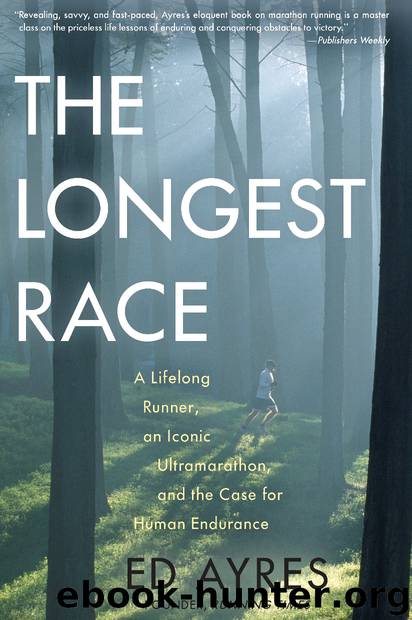The Longest Race by Ed Ayres

Author:Ed Ayres [Ayres, Ed]
Language: eng
Format: epub, mobi
Publisher: The Experiment
Published: 2011-12-31T13:00:00+00:00
I glanced at my watch and felt another trickle of anxiety. There were a good seventeen miles yet to go, and although I was still on target—barely—to break eight hours, I was pooped. Both my bowels and my stomach were empty. Energy flow is dependent on a continuous process of fuel input and waste output—whether in a single person or a whole civilization. But in both realms, I knew, there was an entrenched misconception—the idea that it’s all about supply. In American industry and policy, energy input was virtually defined as supply. The country’s response to the oil crisis of 1973 had been to do whatever was needed to ramp up supply—whether by drilling for more oil in Alaskan wilderness, lopping off more West Virginia mountaintops for coal, or flexing more military muscle in the oil-rich Middle East.
The supply-equals-input equation had understandably shaped beliefs about energy inputs in high-energy sports as well. In 1965, a professor of medicine at the University of Florida, J. Robert Cade, concocted a mixture of sugar and electrolytes he called Gatorade, which in the early 1970s fueled a boom in the athletic energy-supply market. In the 1980s, a distance runner named Brian Maxwell started selling a product he called PowerBars, which he later sold to the Nestle Corporation for $385 million. By the 1990s, energy bars and drinks filled whole shelves in supermarkets.
Among physicists and engineers, however, it wasn’t at all that simple. A nonprofit research group, the American Council for an Energy-Efficient Economy (ACEEE), conducted a breakthrough study showing that three-fourths of America’s increase in industrial output over a thirty-eight-year span had been provided not by increased energy supply but by increased energy efficiency. As a long-time runner, I wasn’t taken entirely by surprise. While the performances of elite runners had improved over the years, they hadn’t improved nearly as much as the consumption of athletic energy drinks and supplements had. When I’d won this race in 6 hours, 4 minutes in 1977, there had been very little in the way of aid stations, and I had consumed only a modicum of homemade energy drink handed to me by Sharon. Yet, last year, in this era of abundant energy supplements, only one of the 703 finishers had run faster on this course than I did twenty-three years earlier.
The now-too-neglected secret, I knew, was that the body’s output, like industry’s, was more strongly determined by energy efficiency than by supply. Both were needed, but efficiency was by far the bigger factor. Elite runners had to know this, at least subconsciously. Dedicated training has the effect of increasing the distance a particular individual can run per hundred calories consumed. If an untrained man tried to run a marathon simply by relying on supply and consuming an energy bar every half-mile, he’d still probably have to be picked up by the meat wagon before he got halfway through the race. If a friend of his who had trained for months went the whole distance and did well,
Download
This site does not store any files on its server. We only index and link to content provided by other sites. Please contact the content providers to delete copyright contents if any and email us, we'll remove relevant links or contents immediately.
The Lonely City by Olivia Laing(4802)
Animal Frequency by Melissa Alvarez(4474)
All Creatures Great and Small by James Herriot(4322)
Walking by Henry David Thoreau(3962)
Exit West by Mohsin Hamid(3828)
Origin Story: A Big History of Everything by David Christian(3692)
COSMOS by Carl Sagan(3625)
How to Read Water: Clues and Patterns from Puddles to the Sea (Natural Navigation) by Tristan Gooley(3469)
Hedgerow by John Wright(3363)
How to Read Nature by Tristan Gooley(3341)
The Inner Life of Animals by Peter Wohlleben(3319)
How to Do Nothing by Jenny Odell(3302)
Project Animal Farm: An Accidental Journey into the Secret World of Farming and the Truth About Our Food by Sonia Faruqi(3221)
Origin Story by David Christian(3202)
Water by Ian Miller(3188)
A Forest Journey by John Perlin(3077)
The Plant Messiah by Carlos Magdalena(2935)
A Wilder Time by William E. Glassley(2863)
Forests: A Very Short Introduction by Jaboury Ghazoul(2842)
